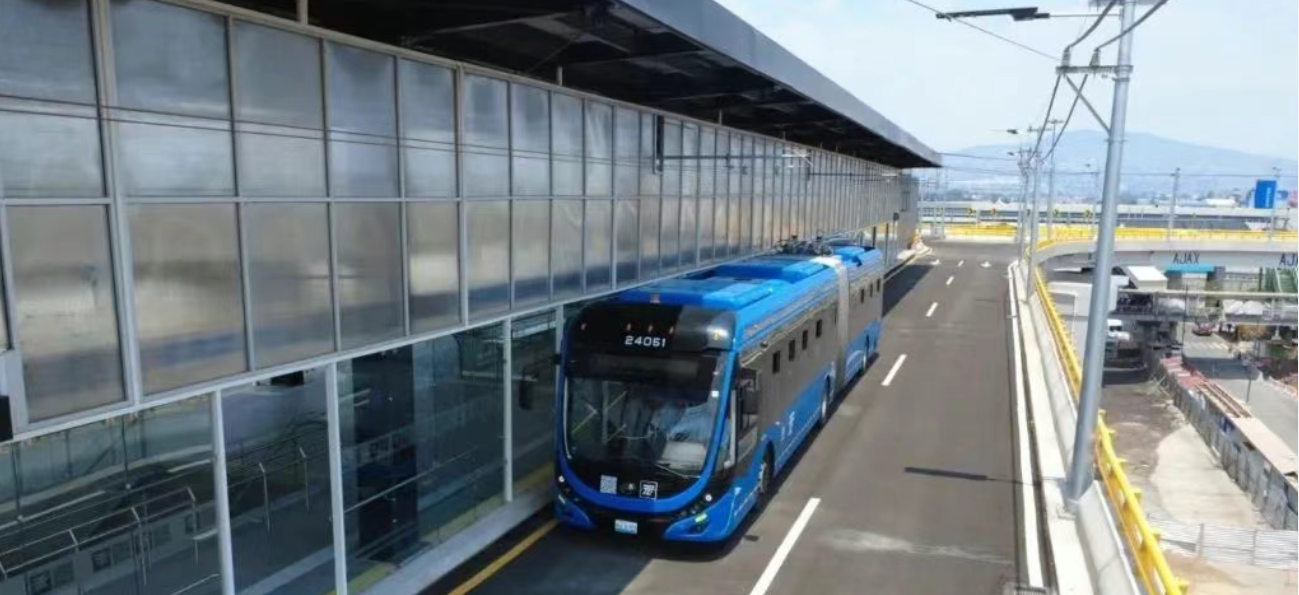
Reservation booth:+86(0)21-3114 8748
Visit/media contact:+8613601815988
QQ:2463282767
email:artsexpo@sgexpo.cn
With the official opening of the Elevardo Line 11 trolleybus on May 18, 2025, Mexico has taken an important step towards modernizing and electrifying its public transport system. The project connects the southeastern urban area of Mexico City with the neighboring State of Mexico and does so like never before: all-electric, built on ground on its own tracks, largely independent of private transport.
The line is 18.5 kilometers long, partly running on a purpose-built 6.7-kilometer elevated route that runs parallel to the busy Avenida Tlavac and Avenida Ignacio Zaragoza, and extends from the Constitución de 1917 metro station (line 8) to the city of Chalco, a fast-growing suburb with a high commuter density. These 13 stations are located between two transport hubs and already transport millions of passengers every day.
The line is part of a comprehensive development plan to improve public transportation in the Mexican Valley metropolitan area, home to more than 22 million people.

The word "Elevado" literally means here: trolleybuses run on viaducts, completely separate from other road traffic. The 10- to 14-metre-high elevated road, made of precast concrete elements, took a record time to build – construction began in October 2020, so it will take about three and a half years to complete.
The construction cost is around 11.3 billion pesos (about 520 million euros), which equates to about 28 million euros per kilometer. In comparison, building a new tram line in Europe typically costs between €10 and €30 million per kilometer.
The project involves the use of 108 18-meter-long articulated Yutong ZK5180C trolleybuses with a battery reserve of up to 100 km, so they can also operate in some areas without overhead lines. The vehicles are air-conditioned, accessible, and equipped with a passenger information system, essentially corresponding to the Yutong vehicles delivered for the city's trolleybus lines from 2019 to 2022.
The 102 battery-powered trolleybuses cost 1.4 billion Mexican pesos (about 64 million euros) – the equivalent of about 590,000 euros per vehicle.
The vehicle is supplied with direct current via a conventional two-pole overhead line. Several substations were installed along the way to supply power, which were connected to CFE's public grid.
The line is designed to carry up to 100,000 passengers per day and is expected to carry up to 230,000 passengers per day. This is roughly equivalent to the capacity of a medium-sized metro line, but the investment cost is much lower.
The project was initiated by the then mayor of Mexico City, Claudia Sheinbaum, and was mainly implemented by the national operator, Servicio de Transportes Eléctricos (STE). Even after Sheinbaum takes office as president in October 2024, the electrification of public transportation remains a key goal at the national level.
Rail Transit Exhibition Booth Reservation
Rail Transit Exhibition Free registration for visit